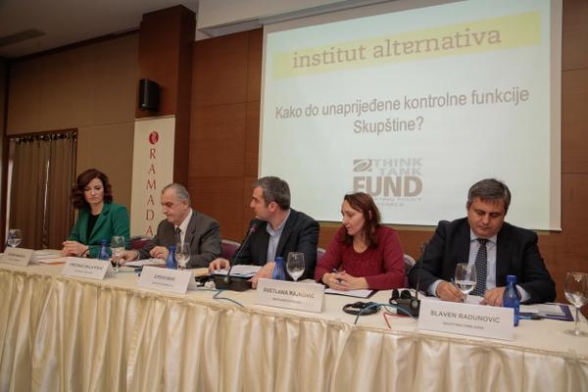The final conference within the project “Analytical Monitoring of the Oversight Function of the Parliament”, devoted to enhancement of the Parliament’s control role, was marked by a discussion on the topic of more effective use of parliamentary mechanisms, with special reference to the negotiation process within chapter 23 – Judiciary and fundamental rights.
The Conference was opened by President of the Parliament of Montenegro Mr Ranko Krivokapić, who emphasised that the civil sector represented an additional power, which, not only gave strength to small society such as Montenegrin but was also crucial in its democratisation. Assessing parliamentarism as a pillar of democracy, Mr Krivokapić said that the Parliament presented a place for dialogue and conflict resolution, wherein the Parliament positioned itself as the most opened and most transparent institution in the region.
As regards the first panel, devoted to efficient use of control mechanisms, the participants stressed the need for defining MPs positions about the legislative regulation of parliamentary actions, then the issue of media coverage of committees’ meetings was opened, and the idea for initiating the concrete responsibility was considered, which could be a result of Parliament’s control mechanisms.
Chairperson of the Committee on European Integration Mr Slaven Radunović addressed the participants during the second panel, devoted to the issue of fighting corruption, with the focus on the negotiation process within the chapter 23. Mr Radunović emphasised the lack of measurable results in the said field as the greatest challenge, what was also indicated by representatives of the European institutions. Referring to the statement by Mr Dirk Lange regarding the additional efforts in fight against corruption and organised crime, Mr Radonović added that the balance clause mentioned in the Progress Report should not be neglected, and emphasised the necessity for more effective actions in the said field. Mr Radunović also mentioned organisation of public debates, which had been contributing to better consideration and amending of draft negotiating positions. Chairperson Radunović said that the Committee, in line with its competences, was using possibilities for greater inclusion of the civil sector, thus contributing to comprehensiveness and inclusivity of the negotiating process.
The gathering was attended by members of the Parliament of Montenegro, representatives of the civil sector, state bodies and media. In addition to Chairperson Radunović, the following were panellist at the conference: Mr Aleksandar Damjanović, Chairperson of the Committee on Economy, Finance and Budget, Mr Rifat Rastoder, Chairperson of the Committee on Political System, Judiciary and Administration, Ms Marta Šćepanović, member of several parliamentary committees, Mr Predrag Bulatović, Chairperson of the Anti-corruption Committee and Ms Svetlana Rajković, negotiator for a negotiating chapters 23 and 24.








